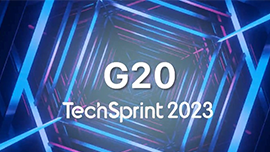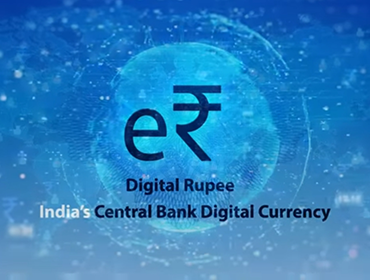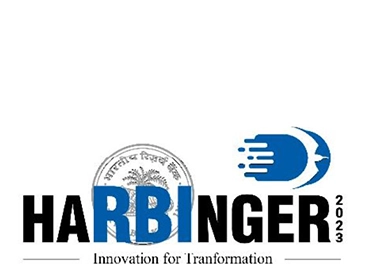 IST,
IST,


About
- The technological innovations in designing and delivery of financial services has significantly altered the dynamics of the financial sector, especially in the last decade. While the exact scope of activities under FinTech will keep evolving with emerging use cases, it is certain that the financial sector will continue to embrace technology even more.
- To keep pace with the dynamically changing landscape, Reserve Bank has been making conscious efforts to facilitate innovation in FinTech sector, for the larger public good. Accordingly, a FinTech Department was setup in January 2022 with a view to give greater focus to the FinTech sector, facilitate innovation and to keep pace with the dynamically changing financial landscape. All matters related to the facilitation of constructive innovations and incubations in the FinTech sector, which may have wider implications for the financial sector/ markets and falling under the purview of the Bank, is being dealt with by the FinTech Department.
Objectives of the department
i. To give dedicated focus to FinTech sector and keep pace with the dynamically changing financial landscape.
ii. Promote innovation in FinTech sector, identify the challenges and opportunities associated with it and address them by devising an appropriate vision, related strategy and guidelines.
iii. To provide a framework for further research on the subject that can aid policy interventions by the Bank.
iv. To conduct inter-regulatory and international coordination on the subject and identify its associated challenges and opportunities and address them in a timely manner.
Innovation Initiatives and Developments
I. Regulatory Sandbox
To enable regulated and orderly growth of FinTech ecosystem in India, the Reserve Bank in August 2019 became one of the few countries that have their very own Regulatory Sandbox (RS) ecosystem. Within the sandbox, the eligible entities can live test their innovative products or services in a controlled environment.
RS is a collaboration between the regulator, the innovators, the financial service providers and the end users which would ensure that Indian consumers continue to receive the best in class financial services.
The Regulatory Sandbox was established based on the recommendations of Working Group on FinTech and Digital Banking, set up by Financial Stability and Development Council - Sub Committee (FSDC-SC). After extensive stakeholder consultations, the final Enabling Framework for the Regulatory Sandbox (RS) was placed on the RBI website on August 13, 2019. The Enabling Framework was further updated on December 16, 2020 and October 08, 2021, incorporating the learnings from the previous cohorts.
The RS is based on thematic cohorts. The themes of the various cohorts under RS are as given below:
I. Retail Payments
II. Cross Border Payments
III. MSME Lending
IV. Prevention and Mitigation of Financial Frauds
V. Theme Neutral – Here innovative products/ services/ technologies cutting across various functions in RBI’s regulatory domain would be eligible to apply.
Further to ensure continuous innovation in the closed themes, the RS also accepts ‘On Tap’ applications for the closed themes. At present, themes of first two cohorts (viz. Retail Payments and Cross Border Payments) are open for ‘On Tap’ applications.
II. RBI Hackathon – HARBINGER
A hackathon is an event organised to bring together people and entities for the development of innovative solutions for the existing challenges in specified area through problem statements. The problem statements are worked upon by the participants who include, but not limited to, individuals, teams, entities from the hardware/software and coding community during the limited time-period of the hackathon. The modus operandi of a hackathon is a competitive event where the participants submit ideas, create solutions, exhibit the prototypes, and the solutions are judged by an external panel to arrive at the winner/s of the hackathon. The solutions thus achieved are primarily technology driven innovative solutions which can be used or promoted by the organisers to refine the existing processes.
In order to find innovative solutions to the existing challenges in the payment and settlement landscape, Reserve Bank has launched the hackathon HARBINGER 2021 on November 9, 2021 and invited solutions from domestic and global fintech companies, programmers, and students on four problem statements related to payments landscape.
The hackathon received encouraging response with 363 proposals submitted by teams from within India and from 22 other countries including the USA, UK, Sweden, Singapore, Philippines, and Israel. The Hackathon ran in three phases with shortlisting of proposals in the first phase, solution development in the second phase followed by the final evaluation in the third phase. The winning solutions were adjudicated by a team of external experts and the teams were awarded prizes.
III. Reserve Bank Innovation Hub
In recent times, multiple central banks & financial institutions across the globe including Bank for International Settlements (BIS) have established Innovation Hubs. To foster innovation in a sustainable manner, it is essential to nurture it through an institutional setup and accordingly, Reserve Bank has set up the Reserve Bank Innovation Hub (RBIH), as announced in its Monetary Policy Statement on Development and Regulatory Policies dated August 06, 2020. The RBIH has been registered as a Section 8 company under Companies Act 2013, with an initial capital contribution of ₹100 crore to encourage and nurture financial innovation in a sustainable manner through an institutional set-up. The Hub has an independent Board with Shri Senapathy (Kris) Gopalakrishnan as the Chairman and other eminent persons from industry and academia as members to guide RBIH. RBIH aims to create an ecosystem that focuses on promoting access to financial services and products for the low-income population.
The objective of the hub is to promote innovation across the financial sector by leveraging on technology and creating an environment which would facilitate and foster innovation. It will strive towards creating an eco-system that would focus on promoting access to financial services and products and would further financial inclusion. It will also develop the required internal infrastructure to promote FinTech research and facilitate engagement with innovators and start-ups. Further, RBIH will collaborate with financial sector institutions, technology, industry and academic institutions and will coordinate efforts for exchange of ideas and development of prototypes related to financial innovations.
Looking Ahead
As part of its mandate, the FinTech Department is working towards preparing a proper institutional framework and conducting proof of concept (PoC), Pilot and rollout of Central Bank Digital Currency (CBDC), promote the use of technologically driven innovative financial products/ services especially to foster financial inclusion, evaluation of technical aspects with respect to NBFC-Peer to Peer lending platform and NBFC-Account Aggregators, pursue and encourage research in financial services and explore and drive the testing and adoption of new SupTech and RegTech tools.
Key Initiatives

Regulatory Sandbox
RS usually refers to live testing of new products or services in a controlled/test environment

Reserve Bank Innovation Hub
To foster innovation in a sustainable manner, it is essential to nurture it through a RBIH setup

HaRBInger 2024
A hackathon is an event organised to bring together people and entities for the development of solutions

G20 TechSprint 2023
A global competition seeking top notch technological innovations for catalysing cross-border payments.

HaRBInger 2023
A hackathon is an event organised to bring together people and entities for the development of solutions

HaRBInger 2021
A hackathon event organised to bring together people and entities for the development of solutions
Key Topics

CBDC
Central Bank Digital Currency (CBDC) is a digital form of currency notes issued by a central bank. CBDC in India, referred to as e₹ (digital Rupee).

Regulatory Sandbox
Regulatory Sandbox refers to live testing of new products or services in a controlled/test regulatory environment for which regulators may (or may not) permit certain regulatory relaxations for the limited purpose of the testing.

RBI Hackathon – HARBINGER
A hackathon is an event organised to bring together people and entities for the development of innovative solutions for the existing challenges in specified area through problem statements.

Reserve Bank Innovation Hub
Reserve Bank Innovation Hub (RBIH) has been setup to promote innovation across the financial sector by leveraging on technology and creating an environment which would facilitate and foster innovation.
Page Last Updated on: November 23, 2022












